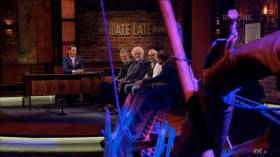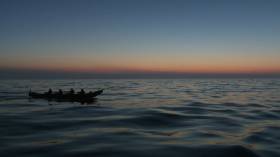Displaying items by tag: The Camino Voyage
Glen Hansard & Crew Talk Camino Voyage On Late Late Show
Glen Hansard, Brendan Begley, Liam Holden and Brendan Moriarty were on The Late Late Show this past Friday evening (16 November) to talk their incredible adventure rowing and sailing a traditional curragh to Spain.
The ‘modern day Celtic odyssey’ is the subject of a new documentary, The Camino Voyage, that had its Irish premiere earlier this year. Footage from the expedition was also featured on TG4 in the spring of 2017.
Hansard, an Oscar-winning songwriter and frontman of rock band The Frames, tells Late Late host Ryan Tubridy how his five weeks on board the Naomhóig na Tinte along the coast of northern Spain sparked a reconnection with his sense of what it means to be Irish.
It also inspired a feeling of ‘meitheal’ with the late Danny Sheehy and his Kerry crew mates — the same spirit of community that’s seen in the Meitheal Mara boat-building collective in Cork.
The 20-minute interview is available for viewers in Ireland to watch back on the RTÉ Player till Sunday 16 December.
Irish Premiere For ‘The Camino Voyage’ Last Weekend
#CaminoVoyage - Saturday night (10 March) saw the Irish premiere of The Camino Voyage as part of the Audi Dublin International Film Festival 2018.
The documentary follows a motley crew including a writer, an artist a stonemason and two musicians — including Oscar-winner Glen Hansard — as they embarked on a 2,500km odyssey by currach from Ireland to northern Spain, following the trail of the Camino de Santiago.
The 2016 adventure in the Naomhóig na Tinte was previously broadcast on TG4 and covered on Afloat.ie by our own Winkie Nixon, but this past weekend marked the first time the international feature-length version had been shown on the big screen in Ireland.
Crew members Brendan Moriarty, Brendan Begley and Liam Holden were in attendance with director Dónal Ó Ceilleachair at the Irish Film Institute on Saturday for the screening, which also served as a tribute to fellow crew Danny Sheehy (Domhnall Mac Síthigh), who died in 2017 while sailing the Naomhóg south to Portugal.
Celebrating the Irish Premiere of The Camino Voyage @IFI_Dub on Saturday night with Brendan Moriarty (left), Dónal OCeilleachair (director), Breanndán O Beaglaoich and Liam Holden. Photo by Simon Lazewski. #ADIFF18 pic.twitter.com/dyZJJlnlHP
— Dublin Film Festival (@DublinFilmFest) March 12, 2018
The Camino Voyage will have its next Irish screening as the opening film of the Dingle International Film Festival next week on Thursday 22 March, and can be seen in Westport on 13 April as part of the Celtic Camino Festival.






























































